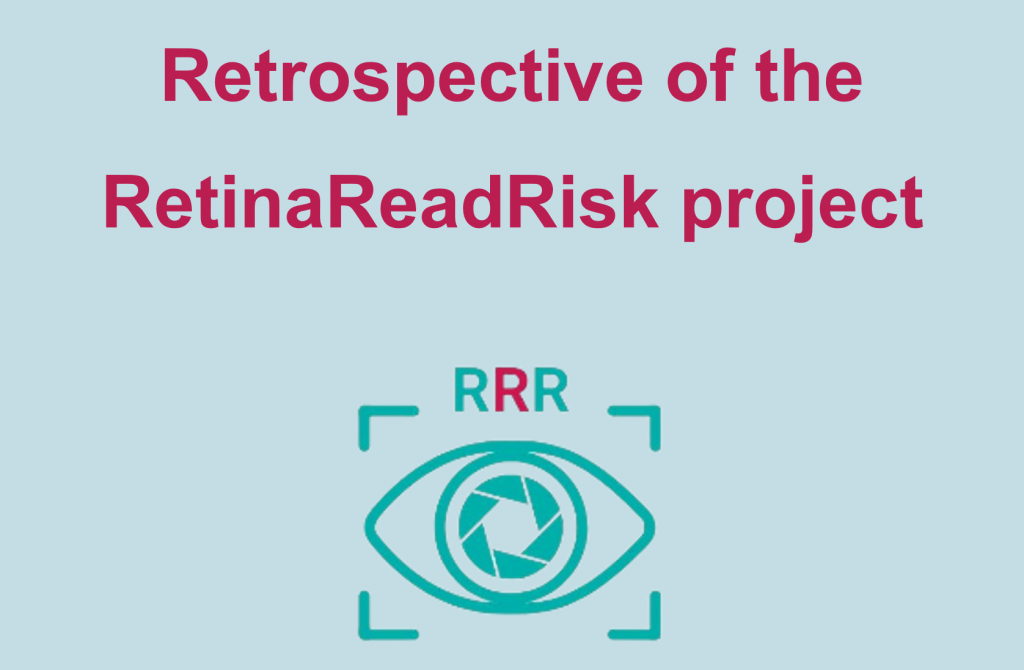Retrospective of the RetinaReadRisk project

The beginnings:
The RetinaReadRisk project was officially launched almost two years ago. It lasts 3 years and its aim is to establish a screening system that is safer for patients and at the same time helps medical staff, shortening the time they spend on these types of processes.
This project has been carried out thanks to a multidisciplinary effort, in which the perceptions of the patient and the carer have been placed at the center of the initiative. The consortium formed at the root of this project includes a wide variety of actors in the innovation ecosystem: research laboratories, hospitals, a patient association, a telecommunications provider, a solutions integrator, a specialist in march of health start-ups and a public interest foundation for the support of applied medical research. They all have the same goal: to improve and personalize the monitoring of diabetic patients through electronic health systems.
For this, the consortium has taken important steps, which we describe below.
The completion of the prototype, hardware and software:
A prototype has been developed to respond to clinical needs and requirements. This has been designed to address the problems identified in the standard screening process for diabetic retinopathy, with relevant actors from the field of telecommunications and with the aim of avoiding technological problems and facilitating the deployment of the solution to the net. For the development of the project, the help of a patient association has been counted on, which has provided the vision of the person suffering from this disease and which, therefore, has made it possible for the solution to meet their expectations and can offer an efficient screening method.
Launch of a clinical trial:
A clinical trial has started in Spain which has allowed more than 2,817 screenings to be carried out. These clinical tests will allow the system to expand the knowledge of Artificial Intelligence (AI) and demonstrate its effectiveness and reliability. RetinaReadRisk has already detected retinopathy in 307 patients at risk for it and referred 171 patients for further testing. Thanks to the doctors and diabetic patients included in the study, the consortium will prepare the next steps necessary to make the system available for medical use.
The creation of the spin-off RetinaReadRisk:
A spin-off has been created (https://retinareadrisk.eu/) to embody the will of the consortium. Its main function will be to access the market and promote the usability of the solution. The spin-off will be the actor that will take over the legacy of the RetinaReadRisk project and continues to develop this new service for better patient care. It will be the main point of contact for the consortium to develop and reach the market.
GENESIS Biomed has played a crucial role in the development and growth of the spin-off. GENESIS Biomed’s support extends beyond the foundational stages within the European project framework; it also includes a significant financial commitment of €100,000 in 2023 through the GENESIS Tech Transfer Boost. Their involvement has gone further, with GENESIS Biomed’s CEO, Josep Lluís Falcó, taking on an interim CEO role for the spin-off until the end of 2023. This included leading the search for the current CEO, highlighting GENESIS Biomed’s comprehensive approach as a venture builder, navigating the challenges of fostering innovation and ensuring the sustainability of the new enterprise.
Finally, the appointment of Miquel Costa, PhD, PDD, as the new CEO in January 2024 will bring a wave of enthusiasm and expertise to the spin-off, heralding a promising future for the company as it advances into its next chapter of growth and innovation.
During this time, the project has been presented in numerous symposia by specialists in the field. For example, during the«54 Congress of the Catalan Society of Ophthalmology«, Dr. Pere Romero-Aroca, head of the Ophthalmology Research Group of the Pere Virgili Health Research Institute (IISPV) and the Ophthalmology Service of the Sant Joan de Reus University Hospital, presented the project during his talk on the role of AI in this field.

